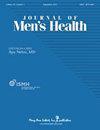Evolution of Anxiety and Depression in Men during the First Six Months of the COVID-19 Pandemic and Factors Associated with Worsening of Mental Health: Retrospective Longitudinal Study
IF 0.6
4区 医学
Q4 Medicine
引用次数: 0
Abstract
Background: The Coronavirus disease (COVID-19) pandemic has had a huge impact on the psychological wellbeing of the population, however, few studies have analysed the psychological consequences for the most vulnerable groups, particularly those suffering from depression and anxiety, and specifically in men. The objective of this study is to analyse the changes in a population of men undergoing active treatment for depression or anxiety and factors associated with these changes. Methods: Retrospective, longitudinal and observational study of a population of 28,294 men in northern Spain. The study variables were sociodemographic variables, chronic comorbidities, COVID-19 infection, anxiolytic and antidepressant drug consumption, and use of healthcare resources. These variables were collected from the Primary Health Care electronic records for the two distinct periods (6 months before and 6 months following the end of the lockdown). To compare drug patterns and the use of healthcare resources a paired Student's T-test was used. To analyse associated factors related to a deterioration of mental disorders, a multivariate logistic regression was performed. Results: In relation to changes in drug patterns, 40% of men saw an increase in at least one Defined Daily Dose (DDD) of their prescribed drugs during the 6 months following lockdown and the number of appointments at health centres and home visits significantly decreased. Factors associated with a deterioration of mental disorders are being under 60 years old, having an income of less than 18,000 euros/year and suffering from more than one comorbidity. Conclusions: The pandemic had a significant impact on men with a previous diagnosis of depression and/or anxiety.COVID-19大流行前6个月男性焦虑和抑郁的演变及与心理健康恶化相关的因素:回顾性纵向研究
背景:冠状病毒病(COVID-19)大流行对人群的心理健康产生了巨大影响,然而,很少有研究分析了最弱势群体,特别是患有抑郁症和焦虑症的人群,特别是男性的心理后果。本研究的目的是分析积极治疗抑郁或焦虑的男性人群的变化以及与这些变化相关的因素。方法:对西班牙北部28,294名男性进行回顾性、纵向和观察性研究。研究变量为社会人口学变量、慢性合并症、COVID-19感染、抗焦虑和抗抑郁药物使用以及医疗资源使用情况。这些变量是从两个不同时期(封锁结束前6个月和结束后6个月)的初级卫生保健电子记录中收集的。为了比较药物模式和医疗资源的使用,使用配对学生t检验。为了分析与精神障碍恶化有关的相关因素,进行了多变量逻辑回归。结果:与药物模式的变化有关,40%的男性在封锁后的6个月内至少增加了一次规定的每日剂量(DDD),在保健中心预约和家访的次数显着减少。与精神障碍恶化有关的因素是年龄在60岁以下,年收入低于18,000欧元,患有一种以上的合并症。结论:大流行对先前诊断为抑郁症和/或焦虑症的男性有重大影响。
本文章由计算机程序翻译,如有差异,请以英文原文为准。
求助全文
约1分钟内获得全文
求助全文
来源期刊

Journal of Men's Health
Medicine-Urology
CiteScore
0.70
自引率
28.60%
发文量
153
审稿时长
10 weeks
期刊介绍:
JOMH is an international, peer-reviewed, open access journal. JOMH publishes cutting-edge advances in a wide range of diseases and conditions, including diagnostic procedures, therapeutic management strategies, and innovative clinical research in gender-based biology. It also addresses sexual disparities in health, life expectancy, lifestyle and behaviors and so on. Scientists are encouraged to publish their experimental, theoretical, and descriptive studies and observations in as much detail as possible.
 求助内容:
求助内容: 应助结果提醒方式:
应助结果提醒方式:


